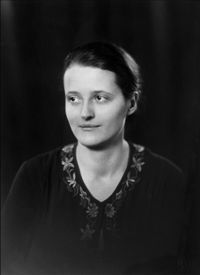Marthe Vogt
| Marthe Vogt | |
|---|---|
 |
|
| Born |
September 8, 1903 Berlin, German Empire |
| Died | September 9, 2003 (aged 100) La Jolla, California, U.S. |
| Nationality | German |
| Fields | Neurology |
| Known for | Neurotransmitters |
| Notable awards | Royal Medal (1981) |
Marthe Louise Vogt (September 8, 1903 – September 9, 2003) was a German scientist recognized as one of the leading neuroscientists of the twentieth century. She is mainly remembered for her important contributions to the understanding of the role of neurotransmitters in the brain, especially epinephrine.
Vogt was born in Berlin, the daughter of two of Germany's leading anatomists, Cécile and Oskar Vogt (French and Danish-German respectively). She was the older sister of Marguerite Vogt.
Marthe studied medicine and chemistry at Berlin University (1922–1927), earning her degree as Doctor of Medicine with research on the microscopial anatomy of the human brain. She also earned a D.Phil in Chemistry for research in biochemistry on carbohydrate metabolism at the Kaiser Wilhelm Institut für Biochemie under C. Neuberg (1927–1929).
In 1929, she began work on pharmacology and endochrinology in the Institute of Pharmacology in Berlin under Paul Trendelenburg where she met Edith Bülbring and Wilhelm Feldberg and where Paul Trendelenburg's son Ullrich became her friend for life. Here Vogt learned about endocrinology and used experimental techniques in pharmacological analysis. By the early 1930s, she had established a reputation as one of Germany's leading pharmacologists, and in 1931, aged just 28, was appointed head of the chemical division at the Kaiser Wilhelm Institut für Hirnforschung ("Brain Science"). Her work focused on the central nervous system and the effects of various drugs on the brain.
With Nazism on the rise throughout Germany, Vogt and other German scientists (including Edith Bulbring), decided that a move to Britain would be greatly beneficial, and in 1935 she arrived on a Rockefeller Travelling Fellowship in England. Vogt joined the British Pharmacological Society and began work with Sir Henry Dale at the National Institute for Medical Research, London. Vogt coauthored a paper with Dale and Wilhelm Feldberg: 'Release of Acetylcholine at Voluntary Motor Nerve Endings' in 1936. Sir Henry Dale was awarded the Nobel Prize for Physiology or Medicine in 1936 based on the work described in this paper, and he credited Feldberg and Vogt in his lecture.
...
Wikipedia
